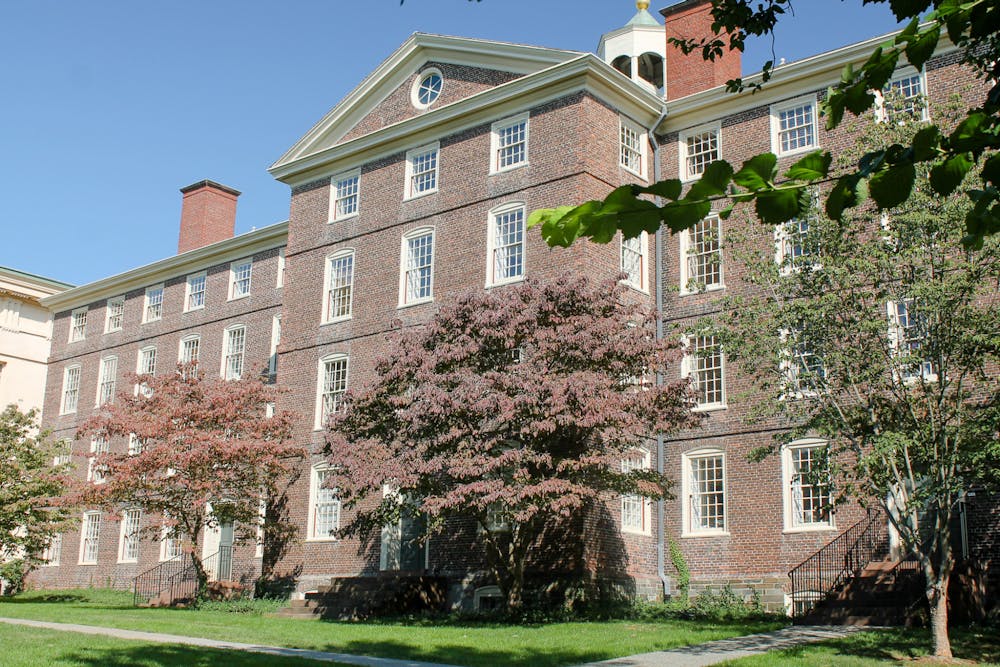President Christina Paxson P’19 discussed plans to scale down COVID-19 testing frequency for vaccinated individuals, noting the nearly $1 million per week price tag on the testing program at Tuesday’s faculty meeting. The University is also in the midst of a vetting process to host between 10 to 20 female Afghan students granted asylum for the upcoming academic year, Provost Richard Locke P’18 said at the meeting.
Paxson celebrated the recent decline in COVID-19 rates on campus, pointing to low case numbers this past week. She attributed this decline to the University going “above and beyond” Centers for Disease Control and Prevention testing guidelines, which do not recommend testing asymptomatic, vaccinated people at all. She suggested aligning University restrictions with CDC guidelines more closely throughout the semester, with more information to be released in the coming days.
In response to concerns regarding contact tracing and travel, Paxson emphasized that the University will be ready “to do surge testing when people come back from the holidays. We’re going to preserve the capacity to ramp up testing if the data tells us we have to. … I wouldn’t want to disassemble a lot of the machinery that we have.”
Paxson also addressed the overall financial status of the University, which is expecting a $30 million deficit this year as well as positive endowment and fundraising growth, which will be detailed in the coming weeks, she added. Strong endowment return could enable the University to bolster its financial aid program and “strengthen Brown’s role in supporting social mobility and college access,” she said.
Locke continued the meeting by discussing the University’s pledge to host Afghan students and scholars who have been granted asylum in the upcoming academic year. The University is currently vetting between 10 to 20 female Afghan students from the Asian University for Women.
The University will “take care of their tuition, their fees, their meals, their housing and everything else they need to succeed here,” Locke said.
Brown has also agreed to host at least two scholars from the Scholars at Risk Organization.
Also at the meeting, Professor of Neuroscience Diane Lipscomb gave an update on the Task Force of Women Faculty as its chair. The task force will look at factors that influence the recruitment, hiring and retention of female faculty.
“This is a really great opportunity. This is not just a Brown issue, it’s a national issue and in fact an international issue,” Lipscombe said. “It’s important … to really think about the impact that we can have within this community.”
Chair of the Task Force on Doctoral Education and Associate Dean of Academic Affairs Thomas Lewis also shared updates on his task force’s progress. The task force will focus on establishing organizational systems to enable the University’s graduate programs to be “world class.”
Lewis explained that the task force will address issues relating to current graduate students, who are worried about completing their work in a “timely way and … launching into successful careers” following the pandemic.
Both task forces are just beginning their work, and their chairs stressed the importance of faculty collaboration and input.
Locke also discussed the Program on Financial Innovation and Sustainability, elaborating on the ad hoc committee’s recommendations. These include more strategic purchasing on behalf of the University through eProcurement technology, diversifying revenue and reducing the rate of tuition growth through the likes of online programs and marginally growing the undergraduate population through increased participation in study-away programs.
During the meeting, the Nominations Committee appointed Professor of English Philip Gould and Senior Lecturer in English Emily Hipchen as interim fall appointees to the Tenure, Promotions and Appointments Committee and Standing Committee for Academic Code respectively, with 94% of faculty voting in favor.
The meeting also featured a moment of silence for Mutlu Konuk Blasing, former professor emerita of English, who died on Aug. 16.
Blasing’s “students were ever-inspired by (her) intellectual breadth, her vast knowledge of American poetic traditions and her rigorous attention to language and form through close reading,” said Richard Rambuss, professor of English. “Her decades-long career at Brown introduced hundreds of Brown undergraduates to a wide range of American poets."
Correction: A previous version of this article incorrectly stated that the University's decision to scale back testing was ultimately a financial decision. The Herald regrets the error.

Alex Nadirashvili was the managing editor of multimedia and social media for The Brown Daily Herald's 133rd Editorial Board. As a former University News editor, he covered faculty, higher education and student life, though his proudest legacy is The Brown Daily Herald TikTok account.





